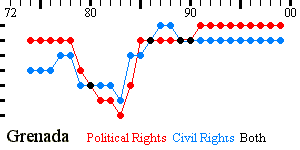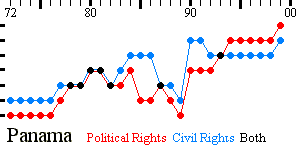Note: This post has been edited (4:00 PM, 12/15) to substitute graphs for lists of numbers. The substance is unchanged.
In deprecating the importance of the capture of Saddam Hussein, Max Sawicky writes:
U.S. political leaders in both parties are quick to laud imaginary progress towards democracy in other countries. It plays to the notion of an inexorable trend based on the shining U.S. example. Actual accountability, given the facts on the ground, is always sloughed off. Has anybody checked on the state of democracy in Panama? I'm not saying it's absent; I wouldn't know. But we invaded the place and a bunch of civilians died. My data here is the extent of utter disinterest in the fate of Panama in the U.S. I can't remember ever seeing a review of the consequences of U.S. intervention.
We call most Latin and South American countries democracies. What is meant is that they are not-Cuba (and lately, not-Venezuela). The fact is that genuine observance of democratic norms is notoriously spotty. The hurdle of democracy is low enough for most any country to jump over it.
I don't link to Sawicky, but this is from today's first post, and I have bold-faced the most interesting part. Just because he "wouldn't know" doesn't mean the rest of us don't. I'm surprised he didn't think to ask the same question about Grenada, which was also invaded by the U.S., just 20 years ago this past October. Both questions are easy enough to answer: it took me about 10 minutes, plus another hour and a half to write this up. This is not the first time Sawicky has depended on others to do his homework for him. Perhaps I should send him a bill.
The best place I know to find information on the progress (and regress) of democracy around the world is Freedom House, which annually rates every country and territory in the world for political rights and civil rights, on a scale of 1 to 7, with 1 being the best and 7 the worst. To take some examples from the latest chart, Iceland, Ireland, the Netherlands, New Zealand, the United States, and quite a few other countries rate "1, 1", the best possible rating, while Saudi Arabia, Syria, Libya, Cuba, Vietnam, Iraq, Afghanistan, and a few others rate "7, 7", the worst possible rating. Note that the chart is dated 2000: if they have more up-to-date information somewhere on their site I have not been able to find it. I imagine Afghanistan and Iraq would score at least a little bit better now.
I don't have the information to argue with the Freedom House ratings for (e.g.) Guinea (6-5), Guinea-Bissau (3-5), or Kiribati (1-1), but the ones for more familiar countries seem plausible enough: consider, for instance, China (7-6), Iran (6-6), Egypt (6-5), Haiti (5-5), Jordan (4-4), The Philippines (2-3), Hungary (1-2), and Canada (1-1).
So how do Grenada and Panama rate? They both score 1-2, the same as France, Germany, Belgium, Italy, the United Kingdom, Spain, Poland, Hungary, and Japan, and slightly better than Greece (1-3).
If we compare them to their immediate neighbors, we find that Grenada rates the same as most of the other islands in the vicinity (1-2 or 2-1), though not quite as high as Barbados (1-1), while Panama rates the same as Costa Rica (1-2) and better than El Salvador (2-3), Nicaragua (3-3), Honduras (3-3), or Guatemala (3-4), though not quite as high as Belize (1-1). It appears that the reason we haven't heard much about Grenadan or Panamanian politics lately is that both countries are getting along tolerably well.
What does all this have to do with the U.S. interventions in Grenada and Panama? Freedom House provides historical ratings going back to 1973. A look at the charts is interesting. Scrolling down to bottom half of this one, we see that Grenada's ratings begin in 1974-75 and go like this (my own graph of the Freedom House data):

Notice the huge jump after 1983-84, when a bloody coup was followed (a few days later) by the U.S. intervention or (as some of us prefer to call it) liberation. It takes time to turn a military occupation into a functioning democracy, and I assume the following year's 5-3 reflects a country that was far from independent (hence the 5 for political rights) but already relatively free (3 for civil rights). American intervention seems to have ended several years of increasingly brutal tyranny and brought about a long period of domestic tranquillity and not-quite-perfect democracy.
The chart for Panama shows much the same pattern. As I've mentioned, the Freedom House figures go back to 1972. For Panama (scroll down to bottom half), they go like this (again my own graph of the Freedom House data):

Here we see a much longer period of tyranny, with some ups and downs, preceding American intervention in 1989 and followed by a large immediate improvement, particularly on the civil rights side (4-2), and general gradual improvement after that.
By the way, when Sawicky writes "disinterest", he means 'lack of interest, inattention': I would call it a Freudian slip, attesting to the actual disinterested way in which the U.S. now and then (and not often enough) liberates countries without getting anything material in return*, but it's probably just ignorance.
Finally, giving credit where credit is due, I have to admit that 'Hesiod' has been relatively sensible -- or perhaps just circumspect -- when it comes to criticizing the capture of Saddam. Who would have suspected that? I still won't give him a link, though.
- - - - - - - - - - - - - - - - - - - - - - - - - -
*If I'm not mistaken, Panama is one of the few Central American countries that have not sent any troops to Iraq. Ungrateful bastards.
Posted by Dr. Weevil at December 14, 2003 03:23 PMYes -- 'disinterest' and 'lack of interest' confusion is one way into the swamp of the hive mind -- they don't have the vocabulary to dissemble, do they?
Nice work.
Posted by: Michael Tinkler on December 14, 2003 05:16 PMWho knew there was actually an answer question? I'm thinking Max wasn't asking it other than rhetorically, but the real answer is illuminating. Thanks, Doc!
Posted by: Slartibartfast on December 15, 2003 10:39 AMGreat post, Dr Weevil!
I took the liberty of using it for a little rant of my own...
http://www.randomjottings.net/archives/2003_12.html#000278%23more
Posted by: John Weidner on December 15, 2003 11:48 PMMind you, there's lots more out there on the history of US involvement in Panama, prior to the invasion.
For instance, a perusal of this link here gives an overview, very brief, of some of Panama's history. As you note, they are currently a functioning democracy but I wouldn't get too excited about the US's involvement prior to the invasion. It doesn't look that good.
I liked this bit especially
"The Panama invasion proved traumatic and controversial. It violated both international law and U.S. government policy against intervening in another nation’s internal affairs. Yet it was welcomed by many Panamanians as the only way to rid the country of a dictator that the United States had supported for many years. Noriega’s headquarters in Panama City was destroyed, but the surrounding poor neighborhood of El Chorillo caught fire and burned to the ground, leaving thousands homeless. Several hundred Panamanians, many of them civilians, died in the fighting. It was the low point in 86 years of rocky relations between Panama and the United States."
Following up on the links between the US and Noriega leads us to his resume. Busy guy.
1970-76 Meanwhile, Noriega is in the pay of the CIA and the Pentagon, reportedly receiving more than $100,000 per year. — Newsweek, 1/15/90
1976 CIA Director George Bush gives him a VIP tour of CIA headquarters in Washington; he resides with Bush's Deputy Director. — Dinges
1977 Carter officials reportedly remove him from the US payroll. — New York Times, 10/2/88
1979 Gives haven to the overthrown Shah of Iran, brutal US-installed dictator.
1981 Becomes part of a ruling military junta after 13-year dictator and SOA graduate General Omar Torrijos dies in a plane crash, later blamed on Noriega and the CIA by other junta members.
Reagan/Bush officials put him back on the US payroll, again reportedly at more than $100,000 per year. — San Francisco Chronicle, 6/11/87
1981-83 Extensive drug trafficking and money laundering involving the Medellin, Colombia cocaine cartel. — Dinges
8/83 Seizes command of the National Guard (to be renamed "Panama Defense Forces"). He is the effective chief of state.
11/83 Washington visits with White House, State Department and Pentagon, including CIA Director William Casey. — Newsweek, 1/15/90
1983-86 The US loves him for: spying on Fidel Castro and Daniel Ortega; allowing the United States to set up listening posts in Panama, with which they monitor sensitive communications in all of Central America and beyond; aiding the American warfare against the rebels in El Salvador and the government of Nicaragua (facilitating the flow of money and arms to the contras, allowing the US to base spy planes in Panama in clear violation of the canal treaties, giving the US permission to train contras in Panama, and spying in support of American sabotage inside of Nicaragua). — Newsweek, 1/15/90
And so on and so forth. Full thing is here.
Biased, naturally, but seems to be accurate.
If you want to admire the great job the US did in bringing democracy to Panama, fine. But don't lose sight of how much damage the US is partially responsible for by their long term support of Noriega.
SOA, by the way, is the School of the Americas. Which is a whole new can of worms.